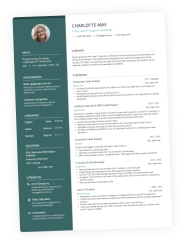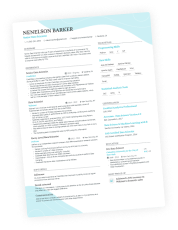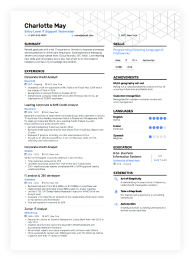"You feel like you've signed up for a 24/7 rat race, where countless Teams meetings and endless Slack messages make up your existence.
While hybrid work does help you in some ways to set time aside, you still feel like you're on a digital hamster wheel of Trello tasks and endless email chains.
Spare time is unheard of, and the rush to complete that next-day project is real.
On the other hand, you've set up your work schedule so that you're able to prioritise tasks and meet impending deadlines before anyone else."
Your superpower?
Time management skills.
Time management is a solid skill set that allows you to stay on top of one of the rarest resources we're all expected to manage in the workplace.
Look at it from your employer's perspective (or Benjamin Franklin's infamous quote) - “time is money”.
"Ordinary people think merely of spending time. Great people think of using it."
Demonstrating time management skills on your CV hints that you're able to stay organised, productive, and efficient in your workload.
Time management is on virtually every recruiter's checklist, as it ensures success for every role: from entry-level to CEO.
We've got no more time to waste, in this Enhancv guide, we'll show you:
- What are time management skills, and why do employers care about whether you can smoothly prioritise tasks;
- +30 skills that are linked with time management and how to quantify them;
- Time management as a soft skill - writing a professional CV that doesn’t sound too vague or cliché;
- Recruiters' favourite CV sections for your time management capacities;
- Additional CV sections you could feature to showcase you know how to organise your time.
What is time management?
Imagine time management as a beautiful symphony. It solely exists when all the different violins, cellos, and other instruments harmonise together.
The musicians need to be led by an experienced and acute conductor, who can follow the music.
The conductor is you, while the different instruments are your workplace tasks.
Time management is all the conscious behavioural and organisational actions (and mindset steps) you take to smoothly complete projects and activities.
Ultimately, time management helps you to:
- enhance and maximise your productivity;
- boost your performance and increase your efficiency;
- effectively plan and prioritise your workload;
- meet specific deadlines and achieve results.
In layman's terms, time management is what you do and for how long you do it, in both your professional and personal capacities.
Time management is one of those skills that you build through your life by being deliberate and consistent. To successfully plan your time, you need discipline, focus, and know-how to lay out the groundwork for success.
Time management is also a soft skill or social, interpersonal ability, that is linked with how you behave and communicate. It may be more difficult to quantify your time management skills on your CV because you can't provide an exact number as to how good you are at allocating your time to different tasks.
Read on to find out how to use different CV sections to showcase your ability to plan and manage your time.
Why is time management important on your CV?
Time management is a skill set that hints at your ability to remain resilient, no matter the abrupt changes in workload or prioritise, you happen to face. Using effective time planning skills, you can make the most out of any given situation.
It's important to demonstrate your ability to manage time on your CV, as it showcases you are more task-oriented and open-minded to challenges and opportunities.
This results in more workplace success and overall increased job satisfaction.
Here are eight more reasons why hiring managers care about time management on your CV. This particular skill set showcases you have the abilities to:
- Stay productive - you can complete tasks on time (following your to-do list) and not compromise on their quality.
- Install more efficient organisation - you can stay on track with appointments, deadlines, and turnaround times. Your ability to plan proactively and systematically allows you to save valuable company resources.
- Consistently meet deadlines - you know exactly how much time you need to allocate to set goals and reach important professional (and/or personal) milestones.
- Concentrate - your mind isn't scattered, and you know what needs to be done at any given moment. By having a higher focus, you become more confident in leading ahead.
- Reduce stress - two main drawbacks affect efficiency: one is those last-minute rushes, and the second is piling up tasks. Both create an overwhelming sense of stress and anxiety across the workplace. Time management is a proactive approach that brings about a more balanced (less chaotic) workflow, creating a space where everyone can work in sync.
- Deliver a higher quality of work - you can see which tasks need more attention and to be prioritised. This allows you to ultimately perform better, make more informed decisions, and be smarter about eliminating resource waste.
- Contribute to a more positive work environment - by completing your tasks on time, you set up a mechanism that ensures all the right conditions are in play for overall organisational growth.
- Sustain a healthy work-life balance - you have set up clear boundaries between your professional and personal time. You don't spend long overtime at the office and never bring work home. This allows you to avoid burnout and lead a more fulfilling life.
What skills, activities and accomplishments help you highlight your time management?
Now that you've understood why time management skills attract employers and recruiters to your profile, let's look at how you can showcase your expertise in time management.
Being a soft skill, time management can be a bit more difficult to quantify on your CV. Use real-life experiences you've had to show how you've built this habit and skill set up over time.
Don’t mention that you're apt at “keeping your eye on the clock”, but show recruiters how you've grown these particular skills.
- Prioritisation - within the workday, you certainly have your time and energy constraints, yet you know which tasks are most critical to start, based on urgency and importance. Prioritisation skills allow you to comply with deadlines; visualise your goals; and work on complicated projects by breaking them down into smaller tasks and milestones.
- Time tracking - this super skill allows you to accurately estimate and monitor how you spend your time to install best practices to remain productive and avoid overcommitting. List all the software and tools you use, e.g. Toggl or various task management apps, within your technical skills section.
- Multitasking - you're able to juggle multiple projects or activities, switching your focus effortlessly. What's important to showcase about your multitasking abilities is that you make no compromises on the quality of your work.
- Scheduling - you're able to manage your own time and that of others. Highlight how you make the best use of everyone's time by balancing personal circumstances with the demands of the project.
- Strategic planning and organisation - to complete various tasks on time, you sometimes need to put chaos in order with a detailed plan or schedule. This skill set showcases to recruiters that you're able to devise tools to put your ideas into motion, organise your resources, and measure your time realistically. If you have experience working as a project manager, detail the time-sensitive strategic steps you took from brainstorming to project implementation.
- Task delegation - "no man is an island", and while you may be very proficient in your role, you do have time and energy constraints. Delegation entitles when you match the tasks to the precise coworkers or employees who have the necessary skill set to complete the assignment. Quantify how various soft skills (communication, humility, meeting deadlines) have helped you to manage tasks.
- Setting goals - you're able to set clear, time-bound, and achievable objectives, allowing you to get the ball rolling on your tasks. Whether it's short-term or long-term goals, this skill allows you to find a sense of direction, motivation, and method. Not only for yourself, but for your team.
- Communication and teamwork - you optimise the work processes by liaising different tasks at the right time and in the right manner. By setting the correct expectations and timelines from the get-go, you're able to make the most out of individual talents.
- Decision-making - in this context, the skill hints at your ability to decide which tasks need to take precedence so as not to waste any time, resources, or energy.
- Focus - remaining productive comes at a price, especially with all the digital distractions and work-from-home interruptions (in the form of a loving, furry friend, deciding to join your Monday Teams meeting). The ability to stay focused allows you to check off tasks, one at a time, and look to the future.
- Problem-solving - within the workplace you may have to deal with overlapping schedules, tasks, or appointments. Strategic, quick, and creative thinking is required for you to find the best opportunity, especially when managing time.
- Documentation and filing - you're able to keep a record of important work processes and have created a sturdy inventory system. Quantify how you've saved time for your employers by creating tutorials for new team members or keeping employee records up to speed with the latest regulatory measures.
- Stress management - when unpredictable emergencies arise, you become the rock your team can lean on. Having a more rational approach, in the long term, allows you to create a healthier work environment.
- Setting boundaries - sometimes knowing when to say "no" to distractions or external tasks can be just what you need to get the work done. When you set boundaries for yourself, you're able to retain control over what your day looks like. Use the MyTime CV section to quantify precisely how you spend your work day and the important boundaries you've set for yourself and others.
- Reliability and accountability - it's how you hold yourself (and others) responsible to meet the deadline. Write within your CV summary about your work ethic and how you're able to build respect and trust with your team and colleagues.
- Adaptability - your ability to stay flexible and open-minded to unexpected change allows you to alter your schedule in the snap of your fingers. Your workplace resilience can also be defined by how you've settled within different roles, teams, and dynamic environments.
- Continuous improvement - your whole career has been focused on optimising your time to learn from every new experience. How you grow as a professional is also linked with your self-awareness and self-discipline skills.
How to demonstrate time management on your resume
- Show recruiters why you deserve the job by highlighting how you set measurable and clear goals. Describe the steps you've undertaken to achieve those on time.
- What about your decision-making skills? Use the opportunity to quantify how you work within a fast-paced, dynamic environment to achieve success.
- Meeting deadlines and delivering great results can go hand in hand with various sections of your CV. Presenting you as a time-savvy, hard-working employee or leader.
- Start each of your experience bullets with a compelling action verb. You could, for example, quantify your delegation skills ("supervised", "managed"), planning skills ("coordinated", "prioritised"), etc.
- Even though time management is difficult to measure, use numbers or statistics to demonstrate your aptitude. Results could also include how you've met deadlines, stayed organised, or focused on urgent tasks.
Example 1: Demonstrate time management in the experience section
- •Efficiently managed the calendars of 11 executives, seamlessly coordinating their demanding schedules, prioritising meetings, and ensuring punctuality, resulting in no missed appointments or scheduling conflicts
- •Maintained a flawless record of timely stock and inventory deliveries from third-party vendors, guaranteeing uninterrupted office operations and cost-effective inventory management
- •Implemented a rigorous urgent-prioritisation matrix to organize and optimize personal workflow, enabling the quick incorporation of unexpected team requests and last-minute changes, contributing to enhanced team productivity
- •Recognised as the most reliable colleague for three consecutive years by senior managers at the annual office Christmas party, reflecting a strong commitment to professionalism, time management, and dedication to the team's success
As in the CV example above, the experience section should demonstrate specific examples of how you've put your time-management skills into practice.
The candidate, in this instance, has given tangible results, demonstrating how they've:
- managed calendars and schedules
- dealt with stock and inventory;
- organised their workflow;
- received any external awards, highlighting their character.
PRO TIP
Keep in mind that your leadership and mentorship experience can further serve to highlight how you manage a team to meet deadlines.
Example 2: Demonstrate time management in the resume summary section
Within your CV summary, you have your first chance to show recruiters why your time management skills make you the ideal candidate.
Use up to five sentences to effectively communicate your potential by focusing on
- years of experience in niched time management;
- success in meeting deadlines and leadership;
- efficiently optimising development cycles;
- achieving excellence within constraints.
Example 3: Show your time management in your achievements sections
The example above focuses on the candidate's abilities to save time and meet deadlines.
What is more, all the successes are backed up by measurable metrics, making them more tangible.
PRO TIP
Always ensure you've customised your achievements section for each job you apply for.
Take the time to identify keywords or job crucial requirements, which could be linked with your time management skills. Next, showcase how you've used those skills in a professional setting.
Ultimately, you should be aiming to highlight the benefits your particular skill set would bring to the company.
Example 4: Demonstrate the skill through other sections of your resume
Apart from the sections listed above, your CV provides you with the real estate to further quantify your time management skill set.
For example, you could use these three sections to showcase to recruiters how you always meet deadlines:
- Certifications - you could also list any time management training and courses you've taken that have helped you excel. Make sure to only feature time management certificates that make sense to the role you're applying for.
- Projects - feature up to three projects that showcase your ability to meet quick, imminent deadlines. Don't forget to include the results of what you've achieved.
- Education - what most people tend to underestimate about this CV section is that it can also hint at how good you are at staying on schedule. Make sure to include the start-end dates of your higher education degrees, as this not only fills in the gaps in your professional history but shows you can graduate on time.
- Technical skills box - there are plenty of time management software and tools that you may happen to use in your day-to-day. If this is important for the role, feature those within your CV as keywords.
Time management: key takeaways for your CV
- Time management is one skill you’ve built up your entire life - while it may be more difficult to quantify, recruiters are always on the lookout for professionals who can prioritise, meet deadlines, and optimise the efficiency of work processes.
- Time is the most precious resource anyone has - use your CV to pinpoint various skills that are linked with time management (e.g. scheduling, setting boundaries, multitasking) to get into the nitty-gritty details of your time management capabilities.
- The best way to quantify your time management skills is in the achievement section, where you focus on up to three soft skills and link them with tangible results of your time management.
- Other excellent sections to feature your time management are the experience bullets and the summary. Once more, ensure you’ve shown recruiters what this particular skill set has helped you achieve.
- Finally, your certifications, projects, education, and technical skill box could also feature your time management success. Just remember to select skills and sections that are the most relevant to the role you’re applying for.



